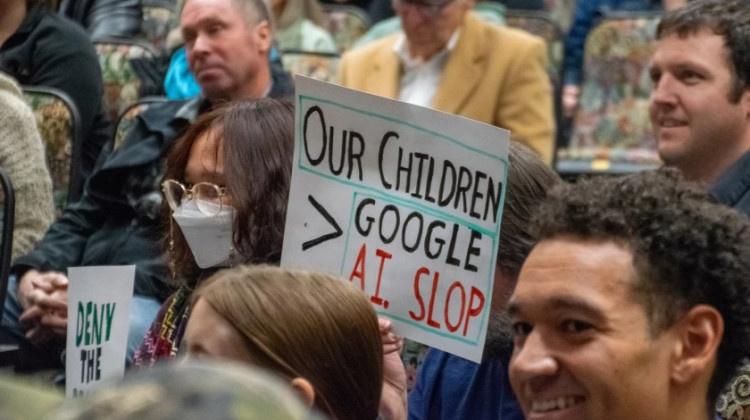
Residents hope the registry will help eliminate unattended or blighted properties in their neighborhoods.
IndyNEARBlight isn’t new to many Indianapolis neighborhoods. Rundown properties have depressed home values and eroded the tax base for years. They’ve attracted crime and discouraged potential homeowners from moving in. Many of these unmaintained properties are rentals hidden behind legal veils that allow their owners to remain unknown, hampering the city’s ability to hold them accountable.
Last summer, the City-County Council established a landlord registry with the hope of remedying the accountability issue. Now only time will tell whether the registry will help alleviate the problem.
Andy Austin bought his home in the St. Clair Place neighborhood on Indy’s near east side four years ago, and he says several things attracted him to the area.
“From a financial position it was very attractive,” Austin says. “Also, I liked the neighbors; I liked how much they were involved in the neighborhood.”
But for Austin and neighbor Leana Kruska, who bought her house around the same time, moving in came with a catch--the seemingly abandoned house across the street.
“People knocked out the front windows, people were knocking all hours of the night,” Kruska says. “It was very apparent what was going on here, but it was hard to prove what was going on without photographs, police runs.”
They suspected drug activity. They called the police--and they called often. But each time police responded, they were unable to verify whether these mischief makers legitimately lived there.
The inability to identify a given property’s owner is one root of the blight that plagues St. Clair Place and similar neighborhoods across Indianapolis. A concerned neighbor can know which property is a problem. They know its address. But, as Austin and Kruska have discovered, finding an owner to contact about problems with a property can be nearly impossible.
“There’s several different city websites you can go for information,” Austin says. “Some of them are not up to date. Does a bank own it? Who owns it, you know? So, we kind of have to do a little detective work to find the history of the house who has it, who’s supposed to have it?”
Indy Gets a Registry
Last year, the state legislature lifted a moratorium on the creation of landlord registries, enabling the Indianapolis City-County Council to establish one for the city, which it did last July. The registry went live Jan. 1 of this year and is maintained by the Department of Code Enforcement.
Landlords are now required to register with the city and pay an annual $5 registration fee for each rental parcel, as well as identify an in-state contact associated with that property.
“The purpose of this is so that we would have a point-person who was ultimately responsible for this property,” says Democratic City-County Councilor Zach Adamson, a co-sponsor of last summer’s registry ordinance.
Adamson says most opposition to the registry came from rental associations, but also from some small operators fearing the registry penalizes people like them. But he says legitimate landlords have nothing to worry about.
“It makes it harder for landlords who are scofflaws regarding our codes for property ownership to continue to rent on large scales oftentimes, despite the fact that they have multiple violations,” Adamson says.
Does It Have Teeth?
But some feel the registry doesn’t go far enough. For example, the ordinance didn’t establish any inspection program that would be used to enforce its provisions. There is a $500 fine for landlords who fail to register, but it’s hard for the Department of Code enforcement to know who to fine if a landlord doesn’t sign up. Adamson blames General Assembly for the registry’s limitations.
“My fear is that the state legislature made it very, very difficult for this to be as impactful as it really could,” he says. “As impactful as we can possibly do this, we have made it.”
John Franklin Hay is executive director of Near East Area Renewal--or NEAR--a non-profit that rehabs neglected properties for resale to low-income homebuyers. He says he wishes the ordinance would’ve gone further.
“It doesn’t have enough teeth,” he says. “I mean, from my perspective, it doesn’t have enough teeth.”
But Hay is quick to add that a weak registry is better than no registry at all.
“It’s one tool that has the capability of--in some very specific cases--turning a corner on the behavior of some bad landlords,” Hay says.
Back at St. Clair Place, Austin and Kruska hope that’s the case. After all the time logging complaints about the trouble property across the street, it was finally raided during a city-wide law enforcement sweep last summer. It now sits empty once again, awaiting demolition or redevelopment.
But Austin says he and Kruska wonder if the issue could’ve been resolved long ago if they’d only known who to contact--especially as the area experiences revitalization, they hope the registry could help speed up that process.
“Because as the neighborhood starts to come up, the discrepancy between the ones that are well-maintained and owner-occupied versus the ones that are these problems…these ones stick out like a sore thumb,” Austin says.
They both agree the registry might not be the only solution for removing the blight that dots their neighborhood streets, but it’s one tool they think could make a difference they didn’t have this time last year.
 DONATE
DONATE






 Support WFYI. We can't do it without you.
Support WFYI. We can't do it without you.